Doha, Day 7: Bulgaria’s Nasar and USA’s Reeves in sensational form on record-breaking day for juniors
Two athletes still young enough to compete as juniors made day seven of the IWF Grand Prix in Qatar the most exciting day yet.
Bulgarian teenager Karlos Nasar claimed a senior world record for the fifth time in the men’s 89kg category, where three athletes who had not featured on the Paris 2024 ranking list at the start of competition jumped straight into the top ten.
In the women’s 71kg, the 20-year-old American Olivia Reeves set seven junior world records in five lifts to enhance her ranking position. Song Kuk Hyang from PRK finished first ahead of the Olympic rankings leader Liao Guifang from China, but the most exciting contest was a USA head-to-head between Reeves and the Olympic 76kg silver medallist Kate Vibert, who finished third and fourth.
 Kate Vibert (USA)
Kate Vibert (USA)
Despite dropping down to 71kg and making a career-high total that exceeded her Olympic performance by 5kg, Vibert finds herself in a worse position in the rankings because of Reeves’ run of success.
Nations can send only athlete per weight category and USA now has two in the top four on the extended list after Reeves made 115-147-262, setting junior world records across the board, and Vibert finished 112-142-254.
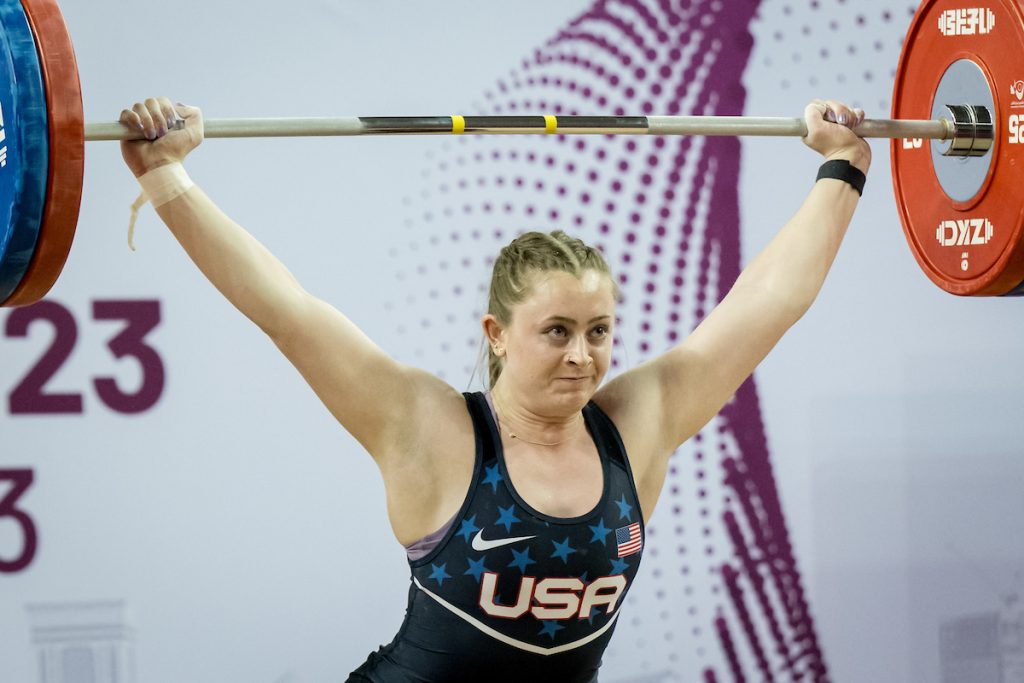 Olivia Reeves (USA)
Olivia Reeves (USA)
Reeves has made 12 from 12 in the past two qualifiers and aims to keep going. “I intend to compete in all seven qualifiers because it gives me the most chances,” she said.
“I never think about the numbers. Take a breath, make a snatch, take a breath, make a clean and jerk, all I focus on is making the lift. It works.”
Asked if she felt sorry for Vibert, Reeves said, “I wouldn’t say sorry exactly. I’m just glad that we’re friends, that we have that dynamic between us. I look up to Kate and I’m excited to see what she can put on the bar too.”
Song failed with a world record attempt on her last lift. She made 120-149-269 while Liao finished 116-148-264, which is 9kg below her best qualifying total.
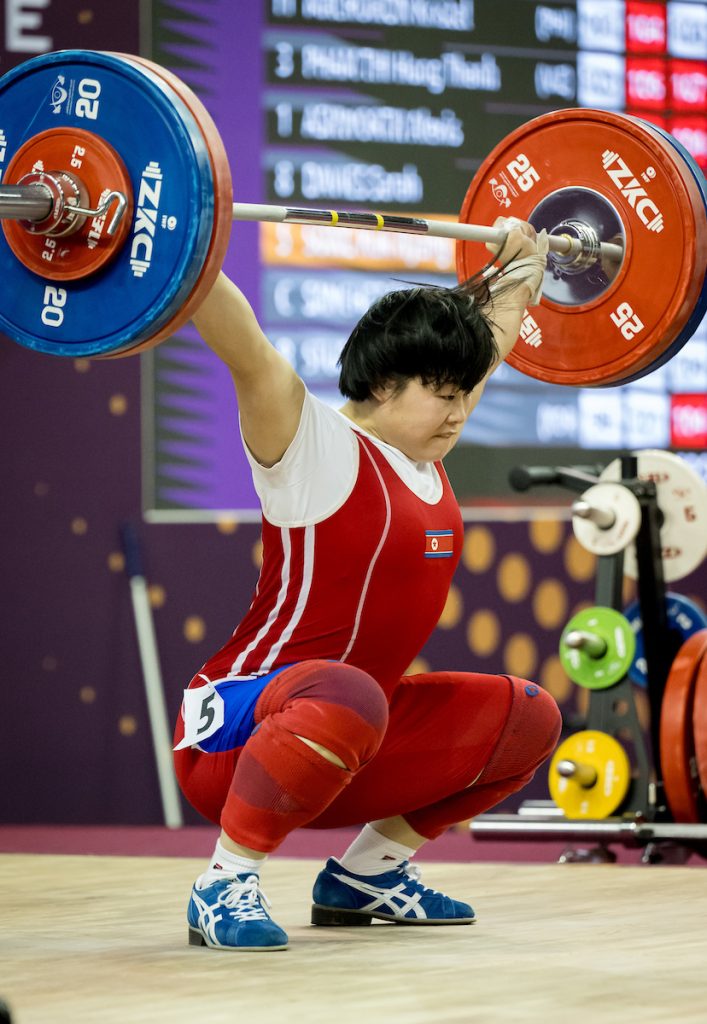 Song Kuk Hyang (PRK)
Song Kuk Hyang (PRK)
Others who made big gains in the rankings were Vanessa Sarno from the Philippines, up 10kg to 249kg, and Olympic bronze medallist Chen Wen-Huei from Chinese Taipei, up 8kg to 243kg.
Mun Minhee from Korea made a 7kg gain in the B group, finishing 1kg behind Eyglo Sturlodottir from Iceland, who made 104-127-231 to move within striking distance of the top ten.
“It was harder to prepare this time because I have my finals for my bachelor’s degree,” said Sturlodottir, who is trying balance long-term medical studies with her weightlifting career. “My second final should be on Tuesday but I’ll be travelling and I’ve been allowed to delay it until January. School has been taking its toll and I was nervous that it might affect my performance here.”
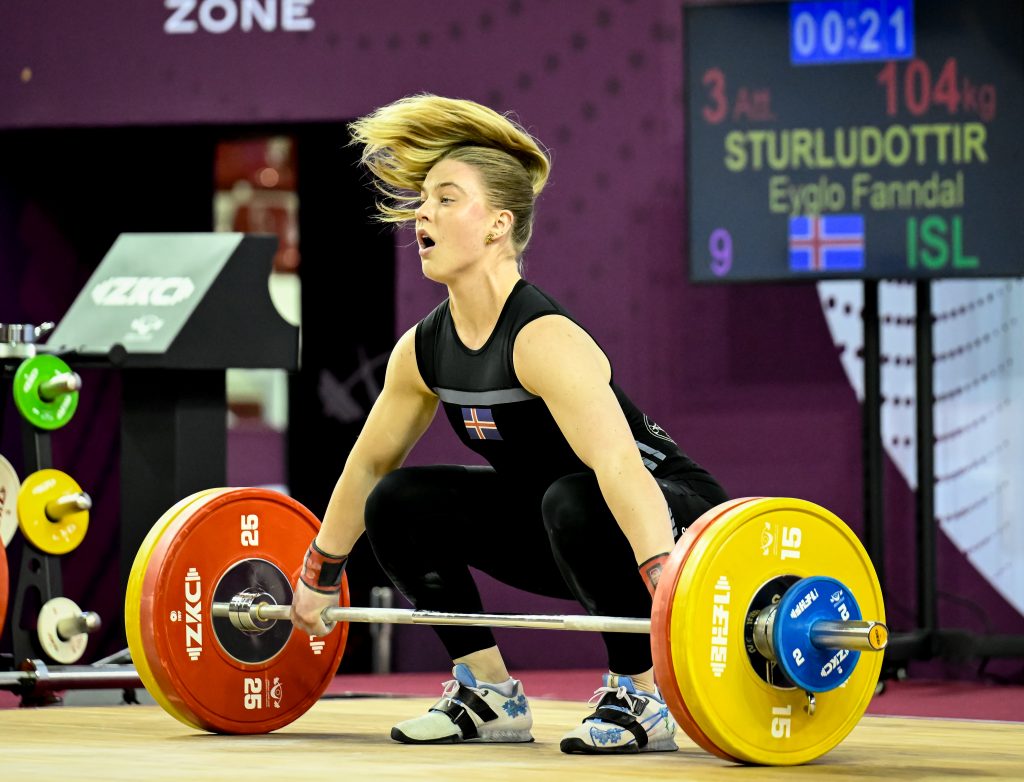 Eyglo Sturludottir (ISL)
Eyglo Sturludottir (ISL)
It did not. For the second qualifier in a row Sturlodottir, 22, made all six lifts. Her progression since qualifying began last December has been remarkable, starting with a total of 213kg, then 217kg, 220kg, 225kg and now 231kg. She has never missed more than two lifts in that run.
A final lift of 223kg gave Nasar victory despite being down in sixth place in snatch, and put him in the record books yet again. By surpassing both his own junior mark and Tian Tao’s senior world record in clean and jerk he took his tally of world records at youth, junior and senior level to 30 since April 2021.
If he has that many aged 19, how many will he have at the end of his career? “Only God can know,” said Nasar, who made 170-223-393 and rated today’s effort the best of the 30. He also said, “Only winning matters next time and in Paris, not world records.”
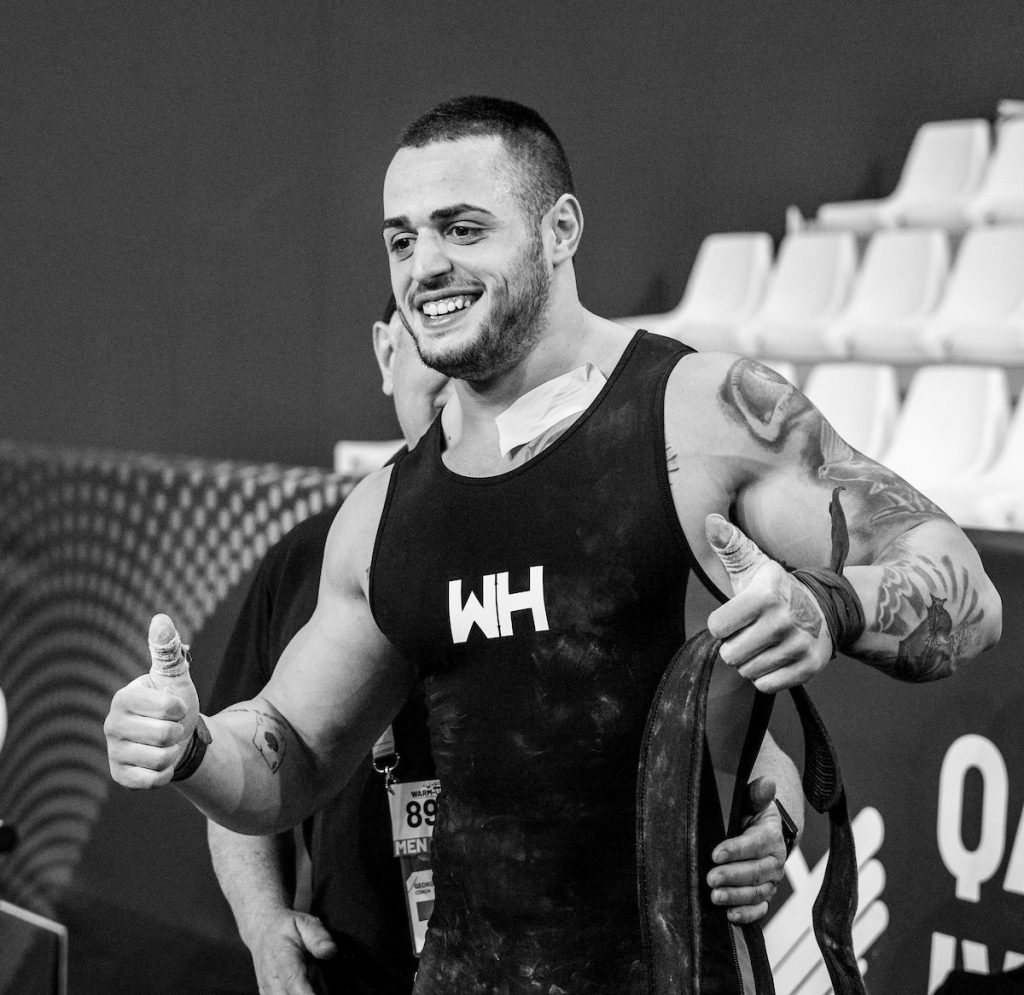 Karlos Nasar (BUL)
Karlos Nasar (BUL)
Next time means the European Championships in his home country in February, where Nasar will hope to retain his senior continental title. His main rival will be the Olympic medallist Antonino Pizzolato from Italy, one of the three who made huge moves in the rankings.
On his return from a back injury that stopped him lifting in three qualifiers, Pizzolato made four good lifts for 170-210-380. That gave him third place in Doha and sixth place in the rankings.
Yeison Lopez Lopez from Colombia, who has competed at 96kg after serving a doping suspension last year, made a six-from-six 180-210-390 for second place. He overtakes team-mate Brayan Rodallegas in the extended rankings and is third behind Li Dayin from China, who withdrew here, and Nasar.
The third big move was by Boady Santavy from Canada, who had his elbow reconstructed ten months ago and lifted at 96kg on his return at the World Championships in Saudi Arabia two months ago. He said at the time, “There are some big numbers coming in Qatar.”
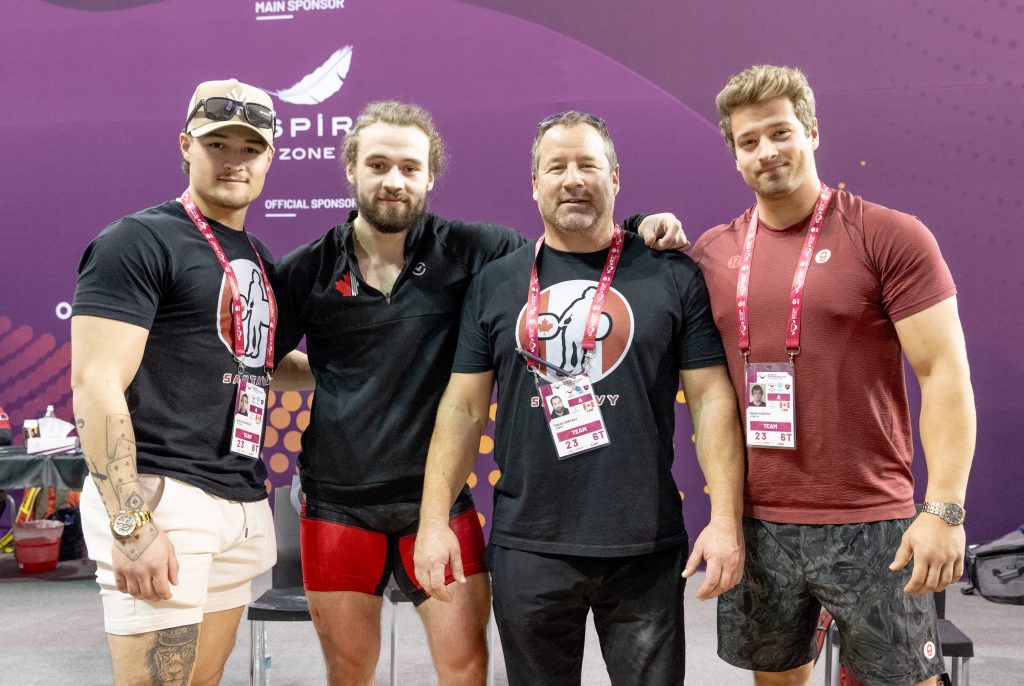 A happy Santavy family
A happy Santavy family
Santavy, 26, was true to his word, missing only his second snatch in making 172-100-372 for snatch silver, sixth place on total and ninth place in the Paris rankings. This was his first career competition at 89kg and also the first time he had such strong family support from two younger brothers and his father.
Noah lifts at 102kg on Tuesday, Bradyn would have competed yesterday but for a back injury – he travelled to Qatar regardless – and father Dalas is his coach. “It’s great to have so much family support,” Santavy said.
“I had the injury and then I had to lose a bunch of weight so I’m pretty stoked right now. I feel good for more, this is just the start. Before the surgery there were a lot of negative thoughts and I couldn’t see myself being at these weights so quickly. I want to be aiming up towards 180-210 but I don’t want to overdo it before Paris.”
Keydomar Vallenilla from Venezuela, third in snatch behind Lopez Lopez and Santavy, missed his last two clean and jerks and finished fifth on 171-207-378, one place behind the PRK athlete Ro Kwang Yol, who took clean and jerk silver on 168-211-379.
Marin Robu from Moldova dropped out of the top ten in the rankings after he bombed out in snatch in the B Group, where two others failed to make a total and two others withdrew.
Two members of the IWF executive board were involved in an intriguing multi-national tussle lower down the rankings, where things get complicated for athletes chasing the one continental slot for Paris 2024.
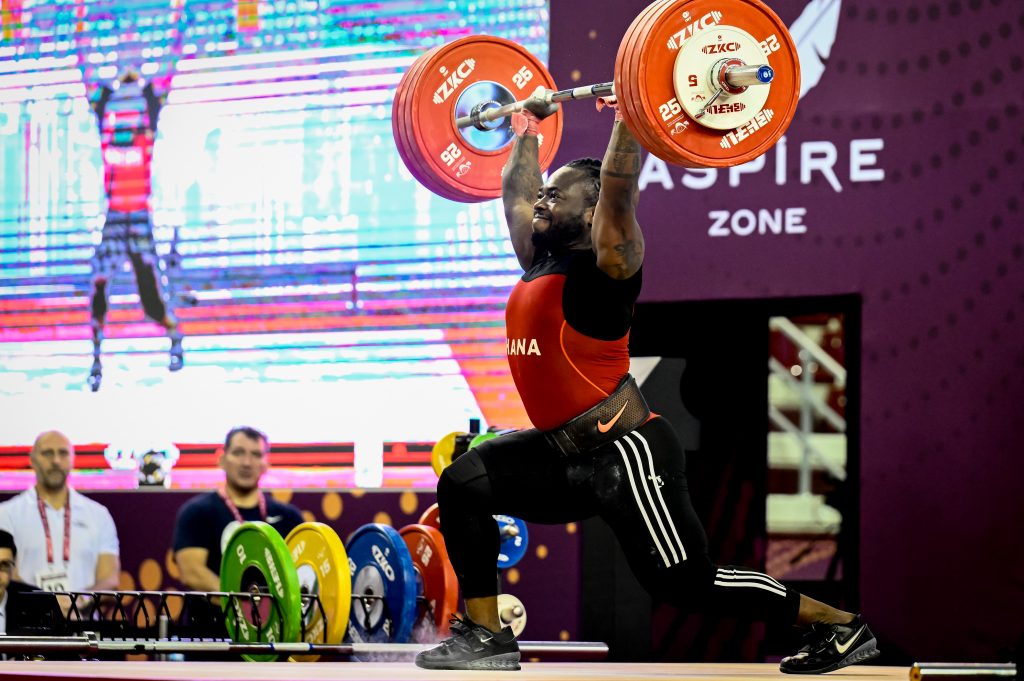 Forrester Osei (GHA)
Forrester Osei (GHA)
Forrester Osei, chair of the IWF Athletes Commission who lifts for Ghana, was given coaching support by the triple Olympic champion and fellow IWF board member Pyrros Dimas, from Greece, who is USA Weightlifting’s performance director. When the American CJ Cummings withdrew from the B Group after being ill overnight, Dimas had some time on his hands and teamed up with Osei’s coach for the day, Damjan Canzek from Slovenia.
It started well for Osei with a 145kg clean and jerk but was followed by five no-lifts, leaving him with a lot to do. Osei, who was born in London, raised in Ghana and now works as a strength and conditioning coach in Qatar, will need to improve his best total by about 25kg by the end of qualifying in April.
Osei and others in contention from Algeria, Nigeria and Cameroon will also need an Egyptian ranked in the top ten, Karim Abokahla, to move up to 102kg for Paris, which he may do. If he does, the 89kg continental place will be open to athletes from Africa or Oceania, rather than Oceania only.
“I’m going to keep trying,” said Osei, 34, who usually lifts at 96kg. “I cut too much weight here. Come on, 185 clean and jerk is not so tough, I’ve done plenty in training.
“Pyrros told me I just have to manage things better. I train alone, I don’t have a coach, it’s difficult. Maybe I can go and train in the US for a few weeks.”
The value of having a coach by your side was clear when Kyle Bruce from Australia put 4kg on his best qualifying total. After missing his first two clean and jerks at 187kg and 188kg, Bruce told coach Martin Harlowe, “I need more rest, trust me. I want 190.” Harlowe agreed, Bruce made it and after a tense wait during a jury review it was confirmed as a good lift.
“It makes such a difference having a coach you know at your side,” said Buce. “At the Grand Prix in Cuba (where he bombed out) I paid my own way and had no support at all.”
That has changed since the Australian federation adopted a new policy a couple of months ago, providing funding and support for its top athletes. Bruce had spent more than A$15,000 of his own money (about US$10,000) before becoming fully funded for the rest of Paris qualifying in the new system.
Like his team-mate Kiana Elliott, who joined Harlowe on his support team, Bruce was grateful to Sam Coffa, Paul Coffa and Lilly Coffa at the national federation for making the change. “It makes all the difference,” he said. “I don’t think I’d have made that last lift without Martin and Kiana here supporting me.”
By Brian Oliver
Photos by Giorgio Scala/Deepbluemedia










